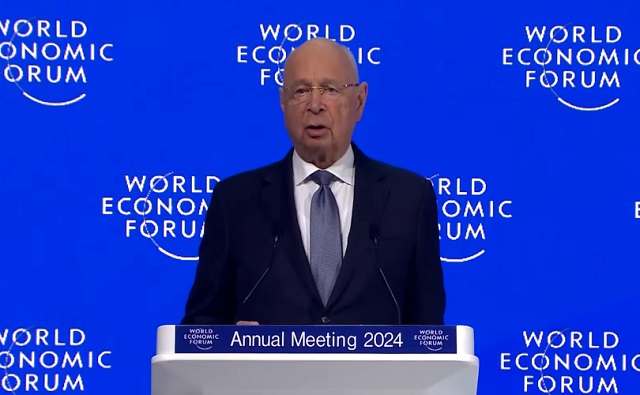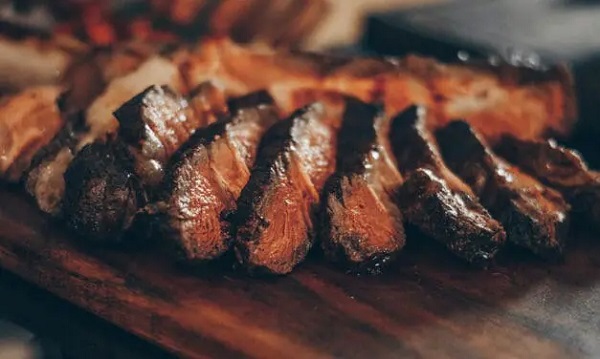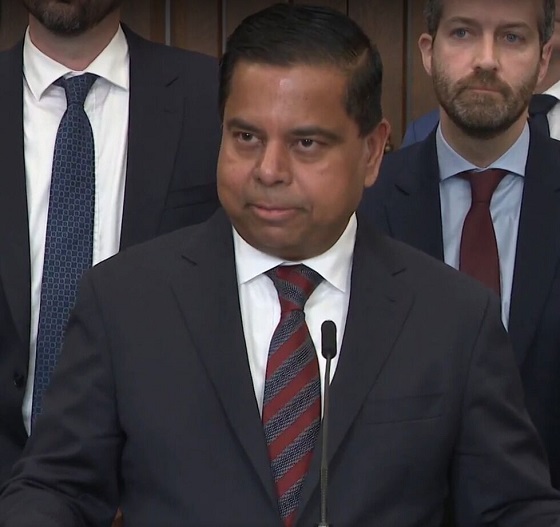Uncategorized
Messiah complex? Klaus Schwab declares unelected Davos elites as ‘trustees of the future’

WEF founder Klaus Schwab delivers an address at the 2024 summit in Davos, Switzerland
From LifeSiteNews
The unelected globalists’ approach to rebuilding trust is to declare themselves trustees over the future of humanity.
In an effort to rebuild trust, World Economic Forum (WEF) founder Klaus Schwab appoints himself and the Davos crowd “trustees of the future” at the WEF annual meeting.
Kicking off the WEF annual meeting in Davos, Switzerland on Tuesday, Schwab focused on the theme of this year’s gathering, “Rebuilding Trust” while never once mentioning rebuilding the trust of private citizens.
READ: UN secretary-general calls for ‘global governance’ in ‘new multipolar order’ at 2024 Davos summit
“We have to rebuild trust – trust in our future, trust in our capacity to overcome challenges, and most importantly, trust in each other,” said Schwab, referring to the Davos crowd.
He then gave a rather peculiar definition of what “trust” means to him:
Trust is not just a feeling; trust is a commitment to action, to belief, to hope
Klaus Schwab, WEF: "We have to rebuild trust… most importantly trust in each other… Trust is a commitment to action, to belief, to hope… We must rediscover & embrace the narrative that has driven humanity since its inception – acting as trustees for a better future" pic.twitter.com/5N4khOQhWs
— Tim Hinchliffe (@TimHinchliffe) January 16, 2024
So, in Schwab’s eyes, trust means committing to action, believing, and hoping.
Therefore, every time Klaus Schwab says, “We have to rebuild trust,” what he’s actually saying is that the unelected globalists need to rebuild their own commitments to action through hope and faith.
How does Schwab and the Davos crowd hope to achieve trust (aka blind commitments to action)?
Why, a great narrative of course!
Schwab regurgitated the need to embrace the WEF’s Great Narrative Initiative, which was launched in November, 2021 as a follow up to the launch of the Great Reset agenda a year prior, stating:
We must rediscover and embrace the narrative that has driven humanity since its inception – acting as trustees for a better future.
Here, we see Schwab’s somewhat circular logic in emphasizing the need for unelected globalists to become stewards of the world.
In order “to rebuild trust” [faith-based commitments to action], “we” [unelected globalists], must act as “trustees.”
Great! And he says this believing this has been the narrative since humanity’s inception.
“The concept of trust and trusteeship compels us to think beyond borders and beyond our lifetimes,” said Schwab, adding, “It encourages collaboration over competition, sustainability over expediency, and empathy over apathy.”
He then appointed himself and everyone else at Davos “trustees of the future.”
In some circles, this is called having a messiah complex.
As trustees of the future, we are responsible for advancing a world which is richer in possibilities, more equitable in opportunities, and more secure in its foundations. Moreover, as leaders in government, business, and society, we bear a particular responsibility to rebuild trust in how we assume our own role as trustees.
Klaus Schwab, WEF: "As trustees of the future, we are responsible for advancing a world which is richer in possibilities, more equitable in opportunities.. As leaders in govt, business & society, we bear responsibility to rebuild trust in how we assume our own role as trustees" pic.twitter.com/GC670YqZ43
— Tim Hinchliffe (@TimHinchliffe) January 16, 2024
In other words, globalists are the ones responsible for rebuilding trust because they appointed themselves as trustees of our collective future.
Schwab concluded his speech by saying:
Trust is a fundamental pillar of our social, economic, and political lives. It is vital for cooperation, social cohesion, and effective, functioning institutions. To rebuild trust, there’s a fundamental need to embody trusteeship, which means to care for the greater good. Let’s use this annual meeting to rebuild trust by exercising our trusteeship individually and collectively for safeguarding the future of humanity and nature.
Klaus Schwab, WEF: "To rebuild trust there's a fundamental need to embody trusteeship, which means to care for the greater good. Let's use this meeting to rebuild trust by exercising our trusteeship individually & collectively for safeguarding the future of humanity & nature" pic.twitter.com/otC9QpHaEt
— Tim Hinchliffe (@TimHinchliffe) January 16, 2024
And with that, Schwab set the stage for the overlapping theme of rebuilding trust at this year’s WEF annual meeting in Davos.
To recap, rebuilding trust means “a commitment to action” by unelected, self-appointed trustees who act as stewards over our social, economic, and political lives.
It is the sort of elitist rhetoric that led to the people losing trust in their institutions long ago – “trust the experts, trust the science, have faith in institutions, don’t do your own research, critical thinking isn’t helping” – all of these phrases have been beaten to the point that anyone with eyes to see or ears to hear can spot the propaganda from a mile away.
Schwab’s brief speech is a continuation of the unelected globalists’ great reset agenda, coupled with the great narrative initiative meant to dictate how society and the global economy is run from the top-down by a group of unelected, self-appointed trustees who “care for the greater good” by “safeguarding the future of humanity and nature.”
Reprinted with permission from The Sociable.
Business
Beef is becoming a luxury item in Canada

This article supplied by Troy Media.
 By Sylvain Charlebois
By Sylvain Charlebois
Canadian beef prices have surged due to a shrinking cattle herd, high transportation costs, and potential market collusion
With summer weather settling in, Canadians are returning to a familiar ritual—ring up the barbecue. But as they approach the meat counter, many are faced with shockingly high prices. This year, the meat aisle has become a case study in supply-side economics and market dysfunction, leaving
consumers to wonder how this all came to be.
Since January, according to Statistics Canada, beef prices have surged dramatically. Striploin is up 34.2 per cent, top sirloin 33.7 per cent, and rib cuts nearly 12 per cent. Pork rib cuts and chicken breasts have each risen 5.9 per cent, while even meatless burger patties are 6.8 per cent more
expensive. Beef has led the way in these increases, and its dominance in the price hikes is striking. What’s particularly concerning is that it’s not just one cut of beef—virtually every option has seen a dramatic jump, putting pressure on Canadian consumers who were already grappling with rising food costs.
The cause behind these increases lies in Canada’s shrinking beef cow inventory, now at just 3.38 million head—the lowest since 1989. This represents a 1.2 per cent drop from last year, but it signals much more than a cyclical decline. Many cattle producers, facing an increasingly volatile market, are choosing to exit the industry while prices are favourable. Others are opting to reinvest in less risky sectors or even shift entirely to crop production, leaving the beef industry in a precarious state. In short, Canada’s beef industry is retreating, and with that retreat comes rising prices, fewer available cattle, and growing uncertainty.
South of the border, the U.S. is seeing a similar trend, but far less severe. According to the United States Department of Agriculture, the
American beef cow herd declined by just 0.5 per cent to 27.9 million head. This relatively modest drop, coupled with less disruption in their production practices, has resulted in more stable prices.
Over the past year, U.S. boneless sirloin steak rose 5.7 per cent, compared to a staggering 22 per cent in Canada. Ground beef saw a 10.8 per cent increase in the U.S., but 23 per cent in Canada. The price difference between the two countries is stark, and Canadians are feeling the inflationary pressure much more acutely.
There are several factors contributing to the price hikes: Canada’s vast geography, high transportation costs, a limited number of federally licensed beef processors, carbon pricing, and higher labour costs. Carbon pricing, in particular, has added a burden to sectors like beef production, where transportation costs are high. Regulations and logistical inefficiencies add to the costs, driving up prices for retailers and, ultimately, consumers.
This combination of factors is having a compounding effect on the price of beef, making it increasingly out of reach for many.
But there’s another possibility we can’t ignore: potential collusion within the industry. In Canada, a small number of large processors control much of the beef supply, which gives them significant influence over prices. The U.S. government has taken strong action against price-fixing among major meat packers like JBS, Tyson Foods, Cargill, and National Beef, leading to multimillion-dollar settlements. In Canada, however, the Competition Bureau has remained largely silent on similar concerns, allowing the possibility of price-fixing to persist unchecked. Perhaps it’s time for Canada to follow the U.S. lead and ensure the beef industry is held accountable for its actions.
The consequences of these rising costs are already evident. According to IBISWorld, Canadian per capita beef consumption fell by 7.1 per cent in 2023 and is expected to drop another 2.1 per cent in 2024. This isn’t merely a shift in dietary preferences—this is a structural change in consumer behaviour. Beef is becoming increasingly viewed as a luxury item, with many budget-conscious households turning to ground beef as a more affordable option. For many Canadians, beef is no longer a staple food but rather an occasional indulgence, reserved for special occasions or holiday meals.
This shift is unfortunate. Beef remains one of the most natural, sustainable sources of protein available to Canadians. Ranchers and processors have made significant strides in improving environmental stewardship, animal welfare, and food safety, often without recognition. Beef is not only nutritionally dense but also supports rural economies and provides a level of traceability few other protein sources can offer.
For many Canadian families, a summer steak on the grill is becoming more of a splurge than a staple. While Canadians will continue to enjoy beef, the frequency and volume of consumption will likely diminish.
Barbecue season hasn’t disappeared, but for many, it’s starting to look a little different: more sausages, more chicken, and fewer striploins. A shame, really, for a product that offers so much more than just taste.
Dr. Sylvain Charlebois is a Canadian professor and researcher in food distribution and policy. He is senior director of the Agri-Food Analytics Lab at Dalhousie University and co-host of The Food Professor Podcast. He is frequently cited in the media for his insights on food prices, agricultural trends, and the global food supply chain.
Troy Media empowers Canadian community news outlets by providing independent, insightful analysis and commentary. Our mission is to support local media in helping Canadians stay informed and engaged by delivering reliable content that strengthens community connections and deepens understanding across the country.
Uncategorized
Poilievre on 2025 Election Interference – Carney sill hasn’t fired Liberal MP in Chinese election interference scandal

From Conservative Party Communications
“Yes. He must be disqualified. I find it incredible that Mark Carney would allow someone to run for his party that called for a Canadian citizen to be handed over to a foreign government on a bounty, a foreign government that would almost certainly execute that Canadian citizen.
“Think about that for a second. We have a Liberal MP saying that a Canadian citizen should be handed over to a foreign dictatorship to get a bounty so that that citizen could be murdered. And Mark Carney says he should stay on as a candidate. What does that say about whether Mark Carney would protect Canadians?
“Mark Carney is deeply conflicted. Just in November, he went to Beijing and secured a quarter-billion-dollar loan for his company from a state-owned Chinese bank. He’s deeply compromised, and he will never stand up for Canada against any foreign regime. It is another reason why Mr. Carney must show us all his assets, all the money he owes, all the money that his companies owe to foreign hostile regimes. And this story might not be entirely the story of the bounty, and a Liberal MP calling for a Canadian to be handed over for execution to a foreign government might not be something that the everyday Canadian can relate to because it’s so outrageous. But I ask you this, if Mark Carney would allow his Liberal MP to make a comment like this, when would he ever protect Canada or Canadians against foreign hostility?
“He has never put Canada first, and that’s why we cannot have a fourth Liberal term. After the Lost Liberal Decade, our country is a playground for foreign interference. Our economy is weaker than ever before. Our people more divided. We need a change to put Canada first with a new government that will stand up for the security and economy of our citizens and take back control of our destiny. Let’s bring it home.”
-

 Business22 hours ago
Business22 hours agoCarney’s European pivot could quietly reshape Canada’s sovereignty
-

 Alberta22 hours ago
Alberta22 hours agoAlberta’s grand bargain with Canada includes a new pipeline to Prince Rupert
-

 Crime1 day ago
Crime1 day agoManhunt on for suspect in shooting deaths of Minnesota House speaker, husband
-

 Bruce Dowbiggin6 hours ago
Bruce Dowbiggin6 hours agoWOKE NBA Stars Seems Natural For CDN Advertisers. Why Won’t They Bite?
-

 Crime6 hours ago
Crime6 hours agoMinnesota shooter arrested after 48-hour manhunt
-

 Energy7 hours ago
Energy7 hours agoCould the G7 Summit in Alberta be a historic moment for Canadian energy?
-

 Aristotle Foundation4 hours ago
Aristotle Foundation4 hours agoThe Canadian Medical Association’s inexplicable stance on pediatric gender medicine
-

 conflict7 hours ago
conflict7 hours ago“Evacuate”: Netanyahu Warns Tehran as Israel Expands Strikes on Iran’s Military Command



